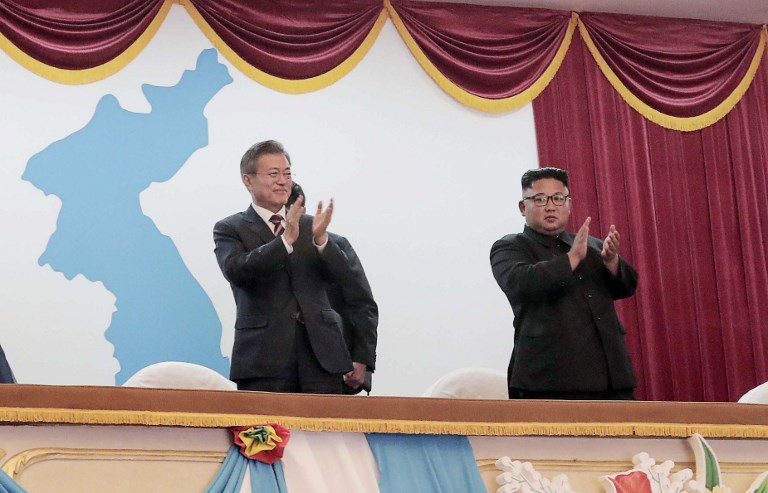
South Korea’s president and the North’s leader Kim Jong Un drove through the streets of Pyongyang together past thousands of cheering citizens on September 18, ahead of a summit where Moon Jae-in will seek to reboot stalled denuclearisation talks between North Korea and the United States. / AFP PHOTO
by Park Chan-kyong
Agence France Presse
SEOUL, South Korea (AFP) — South Korea’s president and the North’s leader Kim Jong Un drove together through the streets of Pyongyang on Tuesday past thousands of cheering citizens before opening a summit where Moon Jae-in will seek to reboot stalled denuclearisation talks between his hosts and the United States.
Kim and Moon embraced at Pyongyang’s international airport — where the North Korean leader had supervised missile launches last year as tensions mounted.
The North’s unique brand of choreographed mass adulation was on full display as hundreds of people waved North Korean flags and another depicting an undivided peninsula — while the South’s own emblem was only visible on Moon’s Boeing 747 aircraft.
Thousands of people, holding bouquets and chanting in unison “Reunification of the country!” lined the streets as Kim and Moon rode through the city in an open-topped vehicle, passing the Kumsusan Palace where Kim’s predecessors — his father and grandfather — lie in state.
“I am acutely aware of the weight that we bear,” Moon told Kim as they opened two hours of formal talks at the headquarters of the ruling Workers’ Party, adding that he felt a “heavy responsibility.”
At a banquet after the first day of the summit, Moon said the “complete denuclearization of the Korean Peninsula and the establishment of peace” were priorities.
The South Korean leader said there would be challenges ahead but that he and Kim had “trust and friendship.”
Kim hailed his relationship with Moon, and said the pair would discuss “various issues… in a frank and open-minded manner.”
The North Korean leader declared his backing for the denuclearization of the peninsula at his Singapore summit with US President Donald Trump in June.
But no details were agreed. Washington and Pyongyang have since sparred over what that means and how it will be achieved.
The US is pressing for the North’s “final, fully verified denuclearisation,” while Pyongyang wants a formal declaration that the 1950-53 Korean War is over and has condemned “gangster-like” demands for it to give up its weapons unilaterally.
A commentary in the Rodong Sinmun, the mouthpiece of the North’s ruling party, repeated the criticism Tuesday, saying Washington was “totally to blame” for the deadlock.
The US called the summit “a historic opportunity for Chairman Kim to follow through his commitment that he made to President Trump.”
“We hope to see a meaningful verifiable step toward the denuclearization of North Korea,” State Department spokeswoman Heather Nauert said, adding that US officials were consulting closely with South Korean counterparts during the summit.
Moon will hold another round of formal talks with Kim on Wednesday, as he urges the North Korean leader to make substantive steps toward disarmament that he can present to Trump.
Moon is due to meet Trump later this month on the sidelines of the UN General Assembly in New York.
‘Rosy headlines’
The dovish South Korean president is looking to tie the inter-Korean process and the US-Northern talks closer together to reduce the threat of a devastating conflict on the peninsula.
At the same time Kim will look to secure closer inter-Korean cooperation as Seoul and Washington move at increasingly different speeds in their approaches to Pyongyang.
Analysts played down expectations.
The meeting “will probably generate rosy headlines but do little to accel denuclearizations to denuclearise North Korea,” Eurasia Group said in a note.
Kim would focus on “areas that promise economic benefits for the North,” it added.
“Progressives inside and outside Moon’s government will have strong incentives to inflate the summit’s accomplishments, initially obscuring what will likely be a lack of major deliverables.”
There have been many previous rounds of negotiations with the North, but deals have subsequently fallen apart — Wednesday will mark 13 years to the day since Pyongyang agreed to abandon all of its nuclear weapons and return to the Nuclear Non-Proliferation Treaty.
It has since carried out six nuclear tests and launched intercontinental ballistic missiles capable of reaching anywhere on the US mainland.
‘First, second, third’
Moon’s own parents fled the North during the Korean War that left the peninsula divided and technically in a state of conflict.
His three-day visit is the first by a South Korean president to Pyongyang in a decade. It is also the two leaders’ third meeting this year.
Moon — whose poll ratings have fallen in the face of economic difficulties — was accompanied by business tycoons including Samsung heir Lee Jae-yong and the vice chairman of Hyundai Motor.
Moon has been pushing inter-Korean engagement, which is complicated by international sanctions against the North. South Korean media have urged caution, calling for substantial progress towards denuclearisation first.
“Quite a number of people are now fed up with the surprise events between the leaders,” the conservative Chosun Ilbo newspaper said in an editorial.
“President Moon must head to Pyongyang with the resolve that the first, second, third agenda of this summit is denuclearisation.”
© Agence France-Presse








